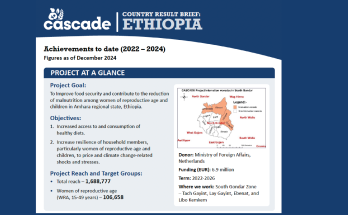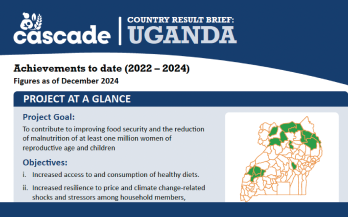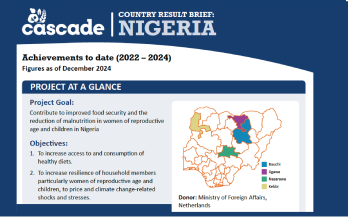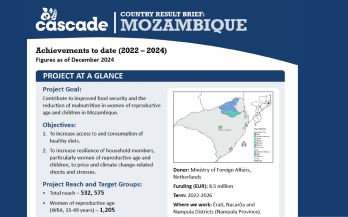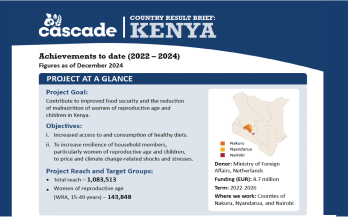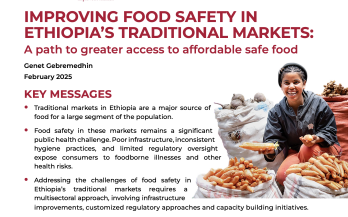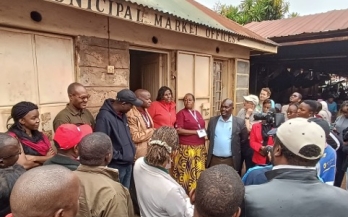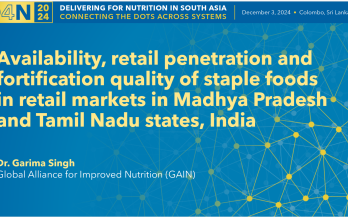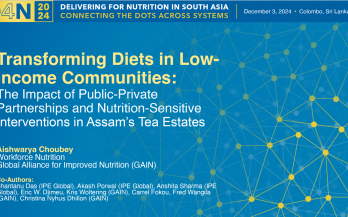- 06/03/2025
The CAtalyzing Strengthened policy aCtion for heAlthy Diets and resiliencE (CASCADE) focuses on improving nutrition and food security by promoting healthier diets through multisectoral collaboration and evidencebased food and nutrition-related policies.
- 06/03/2025
Project Description
In Uganda approximately 29% and 53% of children below the age of five years are stunted and anemic, respectively. Additionally, one-third (32%) of women aged 15-49 years are anemic. Access to and consumption of healthy diets remains a challenge for women and children
- 06/03/2025
Project Description
The Catalyzing Strengthened policy Action for Healthy Diets and resiliencE (CASCADE) project champions multi-sectoral nutrition strategies, scaling up actions and complementing the Government of Nigeria’s efforts to strengthen diets as described in the National Food and Nutrition Policy and Multi-sectoral Plan of Action for Food and Nutrition. CASCADE brings Nigeria’s private sector agri-food system actors together with
- 06/03/2025
Project Description
The Catalyzing Strengthened policy Action for Healthy Diets and resiliencE (CASCADE) project is strengthening Mozambique’s food and nutrition security by fostering collaboration among government, the private sector, and communities. CASCADE frames its activities in Mozambique’s national Food and Nutrition Security Strategy 2024-2030 and the National Strategy of Food Fortification 2023-2027. The project focuses on reinforcing government capacity for policy coordination, fostering collaboration between the public and private sectors to strengthen nutrition-related businesses, and empower community-based organizations to advocate for better nutrition and agricultural services. These efforts are complemented by ensuring that nutritional outcomes are considered within agriculture and health interventions. Crosscutting to its work, CASCADE is supporting both policymakers to make evidence-based decisions and stakeholders working across Mozambique’s food and nutrition security landscape.
- 06/03/2025
The CAtalyzing Strengthened policy aCtion for heAlthy Diets and resiliencE (CASCADE) project is responding to high malnutrition rates in Kenya and is strengthening implementation of nutrition related policies. The priority policy focus is the Kenya National Nutrition Action Plan which aims to accelerate and scale up efforts towards the elimination of malnutrition in Kenya in line with Kenya’s Vision 20301 and global Sustainable Development Goals.
- 05/02/2025
Many low-income, food insecure, and malnutrition-vulnerable communities in Africa, Asia, and Latin America rely on traditional markets to access nutritious fresh food. However, contaminated fresh foods in markets put the well-being of consumers at risk by compromising their uptake of nutrients, needed for proper growth and health. Unsafe food also contributes to food waste and can raise food prices and lower market vendors’ profits. Improving hygiene in traditional food markets is thus vital to improving nutritional outcomes for consumers in low- and middle-income countries and can positively contribute to market vendors’ livelihoods and sustainable local food systems. In 2022, GAIN initiated a process to champion global Guidelines for Food Hygiene Controls in Traditional Markets for Food through the Codex Alimentarius Commission (CAC), where GAIN is an observer organisation Those Guidelines were adopted in November 2024.
- 29/01/2025
The public sector plays a crucial role in transforming food systems through leadership, structures, and processes like policies and budgets as well as the extent to which it enables a whole-of-society approach. Understanding public-sector governance is thus fundamental to designing and implementing food systems transformation initiatives. This working paper provides an overview of public sector governance at the country level, with a food systems lens.
Public governance models vary across countries, and understanding these is vital for addressing challenges and trade-offs and leveraging opportunities in food systems. Local governments, including city governments, have close relationships to the daily lives of residents and landscapes. This makes them key players in bringing together multiple stakeholders, implementing locally relevant solutions, and strengthening capacity through sharing best practices, tools, and lessons learned via city-to-city networks. In a similar way, global food systems-related fora can provide opportunities for national, sub-national, and local governments to enhance the evidence base on food systems transformation and shape wider food systems outlooks.
- 02/12/2024
Availability, retail penetration and fortification quality of staple foods in retail markets in Madhya Pradesh
and Tamil Nadu states, India
- 17/12/2024
Transforming Diets in Low Income Communities_The Impact of PPPs& Nutrition-Sensitive Interventions
